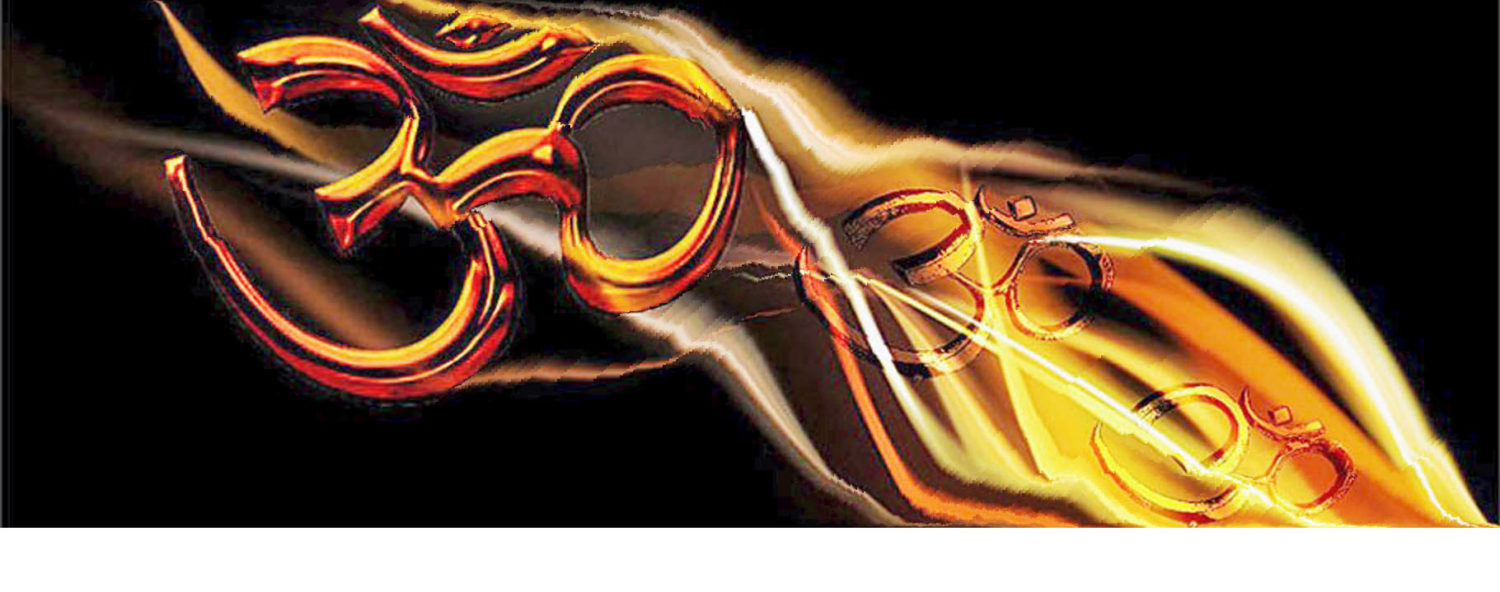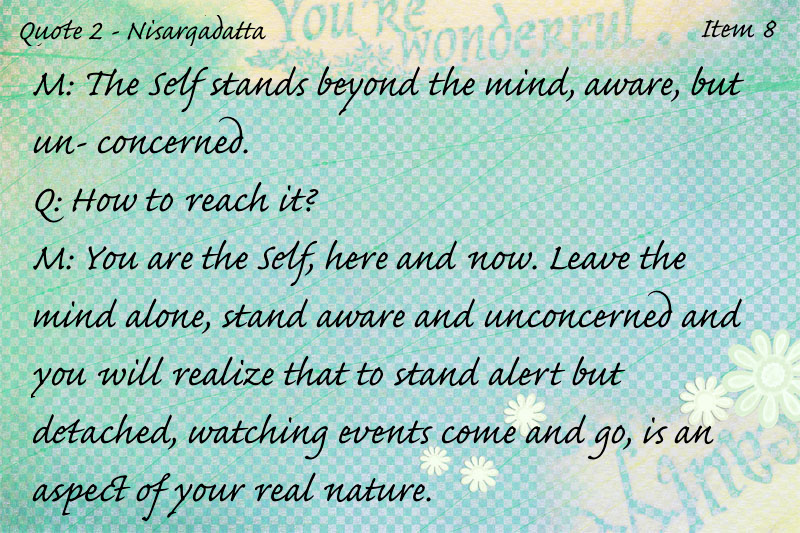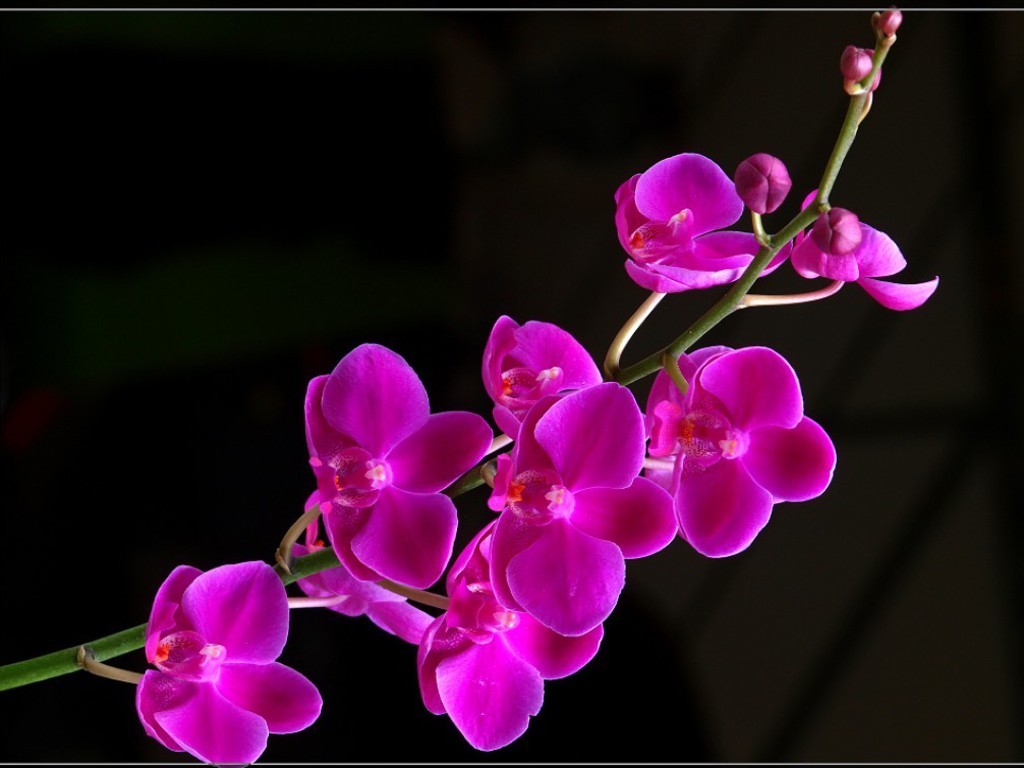Brahma Jnanavali Mala – Adi Sankara
In this work attributed to Sri Adi Sankaracharya, the characteristics of the person who has realized the Real Self are described. The aspirant seeking Liberation and Self-Realization is advised to meditate on these, in order to attain the same pristine state of Perfection and Bliss.
भगवान श्री आदि शंकराचार्यकृत
ब्रह्मज्ञानावलीमाला
Bhagavan Sri Adi Sankaracharya’s Brahma Jnanavali Mala
Knowledge of the GREAT SELF (Brahman – ब्रह्मन्)
1. sakRt SravaNamAtreNa brahmajnAnam yato bhavet
brahmajnAnAvalImAlA sarveshAm mokshasiddhaye
सकृत श्रवणमात्रेण ब्रह्मज्ञानं यतो भवेत् ।
ब्रह्मज्ञानावलीमाला सर्वेषां मोक्षसिद्धये ॥ १ ॥
The work entitled Brahma Jnanavali Maala, by hearing which just once, knowledge of Brahman (Blissful Self) is attained, which enables all to attain liberation.
2. asango’ham asango’ham asango’ham punah punah
saccidAnandarUpo’ham ahamevAham avyayah
असङगोऽहमसङगोऽहमसङजोऽहं पुनः पुनः ।
सच्चिदानन्दरुपोऽहमेवाहमव्ययः ॥ २ ॥
Unattached am I, unattached am I, unattached am I again and again. I am of the nature of Existence-Consciousness-Bliss (Sat-Chit-Ananda); I am the very Self, indestructible and changeless.
3. nityaSuddhavimukto’ham nirAkAro’ham avyayah
bhUmAnandasvarUpo’ham ahamevAham avyayah
नित्यशुद्धविमुक्तोऽहं निराकारोऽमव्ययः ।
भूमानन्दस्वरूपोऽहमहमेवाहमव्ययः ॥ ३ ॥
I am eternal; I am pure; I am ever liberated, I am formless, indestructible and changeless. I am of the nature of infinite bliss; I am the very Self, indestructible and changeless.
4. nityo’ham niravadyo’ham nirAkAro’ham acyutah
paramAnandasvarUpo’ham ahamevAhamavyayah
नित्योऽहं निरवद्योऽहं निराकारोऽहमच्युतः ।
परमानन्दस्वरूपोऽहमहमेवाहमव्ययः ॥ ४ ॥
I am eternal, I am free from blemish; I am formless; I am imperishable and permanent. I am of the nature of supreme bliss; I am the very Self, indestructible and changeless.
5. SuddhacaitanyarUpo’ham AtmArAmo’ham eva ca
akhaNDAnandarUpo’ham ahamevAhamavyayah
शुद्धचैतन्यरूपोहमात्मारामोऽहमेव च ।
अखण्डानन्दरूपोऽहमहमेवाहमव्ययः ॥ ५ ॥
I am of the nature of pure consciousness; I revel in my own Self. I am of the nature of unbroken bliss; I am the very Self, indestructible and changeless.
6. pratyakcaitanyarUpo’ham Santo’ham prakRteh parah
SASvatAnandarUpo’ham ahamevAhamavyayah
प्रत्यक्वैतन्यरूपोऽहं शान्तोऽहं प्रकृतेः परः ।
शाश्वतानन्दरूपोऽहमहमेवाहमव्ययः ॥ ६ ॥
I am the indwelling consciousness; I am calm, free from all agitation; I am beyond Nature (Prakriti). I am of the nature of eternal bliss; I am the very Self, indestructible and changeless.
7. tattvAtItah parAtmAham madhyAtItah parah Sivah
mAyAtItah paramjyotih ahamevAhamavyayah
तत्वातीतः परात्माऽहं मध्यातीतः परः शिवः ।
मायातीतः परंज्योतिरहमेवाहमव्ययः ॥ ७ ॥
I am the supreme Self beyond all truths and fundamental principles (Tattvas), I am the supreme auspicious One, beyond all those in the middle. I am beyond Illusion (Maya); I am the supreme light; I am the very Self, indestructible and changeless..
8. nAnArUpavyatIto’ham cidAkAro’ham acyutah
sukharUpasvarUpo’ham ahamevAhamavyayah
नानारूपव्यतीतोऽहं चिदाकारोऽमच्युतः ।
सुखरूपस्वरूपोऽहमहमेवाहमव्ययः ॥ ८ ॥
I am beyond all the different forms; I am of the nature of pure consciousness; I am imperishable and permanent. I am of the nature of happiness; I am the very Self, indestructible and changeless.
9. mAyAtatkAryadehAdi mama nAstyeva sarvadA
svaprakASaikarUpo’ham ahamevAhamavyayah
मायातत्कार्यदेहादि मम नास्त्येव सर्वदा ।
स्वप्रकाशौकरूपोऽहमहमेवाहमव्ययः ॥ ९ ॥
There is neither illusion (mAyA), nor its effects such as the body and so on for me, ever. I am of the nature of self-luminosity; I am the very Self, indestructible and changeless.
10. guNatrayavyatIto’ham brahmAdInAm ca sAkshyaham
anantAnandarUpo’ham ahamevAhamavyayah
गुणत्रयव्यतीतोऽहं ब्रह्मादीनां च साक्ष्यहम् ।
अनन्तानन्दरूपोऽहमहमेवाहमव्ययः ॥ १० ॥
I am beyond the three basic qualities of the mind (gunas : sattva, rajas, and tamas); I am the witness of even the Creator Brahma and others. I am of the nature of infinite bliss; I am the very Self, indestructible and changeless.
11. antaryAmisvarUpo’ham kUTasthah sarvago’smyaham
paramAtmasvarUpo’ham ahamevAhamavyayah
अन्तर्यामिस्वरूपोऽहं कूटस्थः सर्वगोऽस्म्यहम् ।
परमात्मस्वरूपोऽहमहमेवाहमव्ययः ॥ ११ ॥
I am of the nature of indwelling Supersoul; I am immutable; I am all-pervading. I am of the nature of the supreme Self; I am the very Self, indestructible and changeless.
12. nishkalo’ham nishkriyo’ham sarvAtmA Adyah sanAtanah
aparokshasvarUpo’ham ahamevAhamavyayah
निष्कलोऽहं निष्क्रियोऽहं सर्वात्माऽऽद्यः सनातनः ।
अपरोक्षस्वरूपोऽहमहमेवाहमव्ययः ॥ १२ ॥
I am devoid of parts; I am actionless; I am the Self of all; I am the primordial one; I am the ancient, eternal one. I am of the nature of directly intuited Self. I am the very Self, indestructible and changeless.
13. dvandvAdisAkshirUpo’ham acalo’ham sanAtanah
sarvasAkshisvarUpo’ham ahamevAhamavyayah
द्वन्द्वादिसाक्षिरूपोऽहमचलोऽहं सनातनः ।
सर्वसाक्षिस्वरूपोऽहमहमेवाहमेवाहमव्ययः ॥ १३ ॥
I am of the nature of being a witness of all pairs of opposites; I am immovable; I am eternal. I am of the nature of being a witness of everything; I am the very Self, indestructible and changeless.
14. prajnAnaghana evAham vijnAnaghana eva ca
akartAham abhoktAham ahamevAhamavyayah
प्रज्ञानघन एवाहं विज्ञानघन एव च ।
अकर्ताहमभोक्ताहमहमेवाहमव्ययः ॥ १४ ॥
I am a mass of awareness and I am a mass of consciousness. I am not a doer nor an experiencer. I am the very Self, indestructible and changeless.
15. nirAdhArasvarUpo’ham sarvAdhAroham eva ca
AptakAmasvarUpo’ham ahamevAhamavyayah
निराधारस्वरूपोऽहं सर्वाधारोऽहमेव च ।
आप्तकामस्वरूपोऽहमहमेवाहमव्ययः ॥ १५ ॥
I am of the nature of being without any support, and I am also the support of all. I am of the nature of all desires fulfilled; I am the very Self, indestructible and changeless.
16. tApatrayavinirmukto dehatrayavilakshaNah
avasthAtrayasAkshyasmi ahamevAhamavyayah
तापत्रयविनिर्मुक्तो देहत्रयविलक्षणः ।
अवस्थात्रयसाक्ष्यस्मि अहमेवाहमव्ययः ॥ १६ ॥
I am free from the three kinds of afflictions (those in the body, those from other beings and those caused by higher powers); I am different from the three bodies (gross, subtle and causal bodies). I am the witness of the three states of waking, dream and deep sleep; I am the very Self, indestructible and changeless.
17. dRg dRSyau dvau padArthau stah parasparavilakshaNau
dRg brahma dRSyam mAyeti sarvavedAntaDiNDimah
दृग्दृश्यौ द्वौ पदार्थो स्तः परस्परविलक्षणौ ।
दृग् ब्रह्म द्र्रिश्यं मायेति सर्ववेदान्तडिण्डिमः ॥ १७ ॥
There are two things which are the seer and the seen; they are different from each other. The seer is the Self (Brahman) and the seen is Illusion (Maya). Thus all Vedanta proclaims.
18. aham sAkshIti yo vidyAt vivicyaivam punah punah
sa eva muktah so vidvAn iti vedAntaDiNDimah
अहं साक्षीति यो विद्याद्विविच्यैवं पुनः पुनः ।
स एव मुक्तः सो विद्वानिति वेदान्तडिण्डिमः ॥ १८ ॥
“I am the Witness”; one who realizes this after carefully contemplating again and again; He alone is liberated; He is the enlightened one. Thus Vedanta proclaims.
19. ghaTakuDyAdikam sarvam mRttikAmAtram eva ca
tadvad brahma jagat sarvam iti vedAntaDiNDimah
घटकुड्यादिकं सर्व मृत्तिकामात्रमेव च ।
तद्वद्ब्रह्म जगत् सर्वमिति वेदान्तडिण्डिमः ॥ १९ ॥
The pot, wall, and so on, are all nothing but clay. Likewise, the entire universe is nothing but the Self (Brahman). Thus Vedanta proclaims.
20. brahma satyam jaganmithyA jIvo brahmaiva nAparah
anena vedyam sacchAstram iti vedAntaDiNDimah
ब्रह्म सत्यं जगन्मिथ्या जीवो ब्रह्मैव नापरः ।
अनेन वेद्यं सच्छास्त्रमिति वेदान्तडिण्डिमः ॥ २० ॥
Brahman, the Self, is real (Satya); Jagat, the universe, is illusion (mithya). Jiva, the individual soul, is Brahman itself and not different. This is what should be understood as true Sastra, scriptural teachings. Thus proclaims Vedanta.
21. antarjyotirbahirjyotih pratyakjyotih parAtparah
jyotirjyotih svayamjyotih Atmajyotih Sivo’smyaham
अन्तर्ज्योतिर्बहिर्ज्योतिः प्रत्यग्ज्योतिः परात्परः ।
ज्योतिर्ज्योतिः स्वयंज्योतिरात्मज्योतिः शिवोऽस्म्यहम् ॥ २१ ॥
I am the Inner Light, the Outer Light, the Indwelling Light, Higher than the Highest. I am the Light of all Lights, Self-Luminous, the Light that is the Self; I am the Auspicious One.
॥ ईति श्री आदिशंकरभगवत्पादकृ त ब्रह्मज्ञानावली सम्पूर्ण ॥
॥ ईति श्री आदिशंकराचार्यकृत ब्रह्मज्ञानावलीमाला सम्पूर्ण ॥
Thus Brahma Jnanavali rendered by Sri Adi Sankara Bhagavat Pada comes to a close.
Thus Brahma Jnanavali Mala rendered by Sri Adi Sankaracharya comes to a completion.
Originally translated by Shri S. N. Sastri
https://indiaspirituality.blogspot.com/2013/06/brahma-jnanavali-mala-by-shri-adi_26.html










